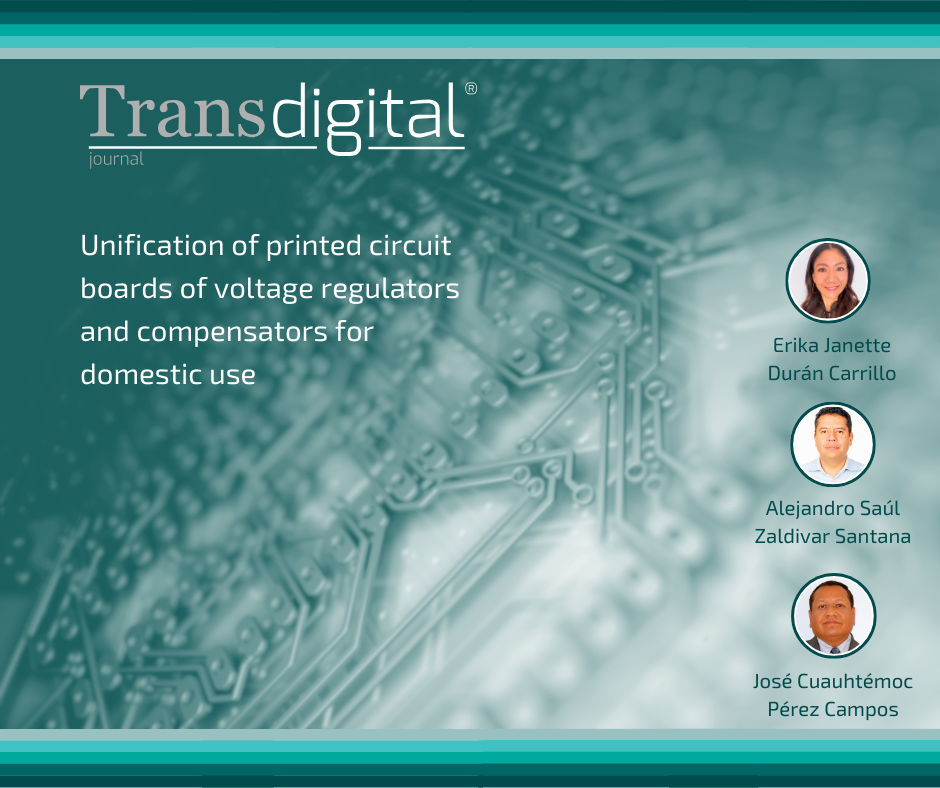Unification of printed circuit boards of voltage regulators and compensators for domestic use
DOI:
https://doi.org/10.56162/transdigital315Keywords:
printed circuit boards, voltage regulators, voltage compensators, benchmarkingAbstract
The study proposes an improvement for voltage regulators and compensators: it explored the unification of printed circuits and proposed the assembly line with the purpose of offering a competitive product with immediate availability to the Mexican market. The above was done considering the quality standards applicable to voltage regulators and compensators. The aim was to determine the feasibility of unifying four printed circuit boards of voltage regulators and compensators on a single board. The competitiveness and profitability analysis were also carried out with respect to current suppliers. For this, it was necessary to define a production model and determine production costs. Subsequently, the benchmarking analysis was carried out to determine if the proposed product is competitive, with reference to the products offered by current suppliers. The findings of the study suggest that there is technical feasibility in the development and unification of a single printed circuit board for four different models. However, it is also concluded that, in terms of costs, the generation of two unified cards would be better: one for voltage regulators and another for voltage compensators, since the latter require a greater number of components, such as relays and semiconductors for time setting (timer) and voltage cutoff functions. It is estimated that for the case of regulators, an additional reduction of up to 15% can be achieved in the cost of components that make up the printed circuit board.
References
Coombs, C. F. (2008). Printed Circuits Handbook (6ta. ed.). McGraw-Hill.
Hernández Sampieri, R., Fernández Collado, C., & Baptista Lucio, P. (2006). Metodología de la investigación. McGraw-Hill.
Hillmanurtis.com (2021). Rogers PSB Vs Fr4 PSB and its Performance. Página web official de Hillman Curtis. https://hillmancurtis.com/rogers-pcb/
IPC (2021). IPC standards. Página web oficial de IPC. https://www.ipc.org/ipc-standards
ISO (2015). ISO 9001:2015 Sistemas de gestión de la calidad. https://www.iso.org/obp/ui/es/#iso:std:iso:9001:ed-5:v1:es
Khandpur, R. S. (2006). Printed Circuit Board Design, Fabrication, Assembly and Testing. McGraw-Hill.
Laverde A. (2020). Diseño de tarjetas electrónicas PCB con estándares internacionales. Aldelta.
NYCE (2016). NMX-I-60065-NYCE-2015 Equipo electrónico-aparatos de audio, video y aparatos electrónicos análogos-requisitos de seguridad, Publicación de declaratoria de vigencia en el DOF 22/02/2016. NYCE S. C.
Pavisich Serate, L. (2006). Las nuevas Herramientas de la Administración Moderna. Página web oficial de Comercio Exterior. https://comercioexteriorcunl.files.wordpress.com/2013/10/reg060124203711.pdf
PCBWay.com (2021). Apilado de PCB de aluminio. Página oficial de PCBWay. https://www.pcbway.es/pcb_prototype/General_introduction_of_Aluminum_PCB.html
Proto-Electronics.com (2021). Material de los PCB: una elección importante para su tarjeta electrónica ensamblada. Página web oficial de Proto-Electronics. https://www.proto-electronics.com/es/blog/material-de-los-pcb-una-eleccion-importante-para-su-tarjeta-electronica-cableada
RAE (2021). “Riesgo” en Diccionario de la Lengua Española. Página web oficial de la Real Academia Española. https://dle.rae.es/riesgo
Robertson, C. T. (2003). Printed Circuit Boards Designer´s Reference: Basics. Prentice Hall.
Spendolini, M. J. (1994). Benchmarking. Norma

Downloads
Autor de correspondencia
El autor de correspodencia se identifica con el siguiente símbolo: *Published
How to Cite
License
Copyright (c) 2024 Erika Janette Durán Carrillo, Alejandro Saúl Zaldivar Santana, José Cuauhtémoc Pérez Campos

This work is licensed under a Creative Commons Attribution 4.0 International License.
All articles in Transdigital are licensed under a Creative Commons Attribution 4.0 International License. Authors hold the copyright and retain publishing rights without restrictions.









